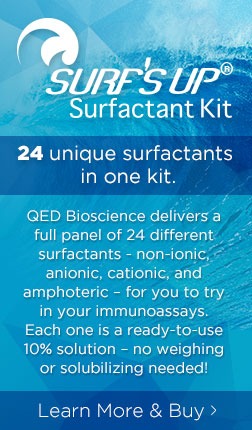Anti-Procollagen Type I C-Peptide (PIP) Antibody (42043)
$469.00
| Host | Quantity | Applications | Species Reactivity | Data Sheet | |
|---|---|---|---|---|---|
| Mouse | 100ug | WB,ELISA,IHC | Human, Bovine, Canine, Equine |  |
SKU: 42043
Categories: Antibody Products, Cell Adhesion Molecule Antibodies, Products
Overview
Product Name Anti-Procollagen Type I C-Peptide (PIP) Antibody (42043)
Description Anti-Human Procollagen Type I C-Peptide (PIP) Mouse Monoclonal Antibody
Target Procollagen Type I C-Peptide (PIP)
Species Reactivity Human, Bovine, Canine, Equine
Applications WB,ELISA,IHC
Host Mouse
Clonality Monoclonal
Clone ID PC8-7
Isotype IgG1
Immunogen Human Procollagen Type I C-Peptide
Properties
Form Lyophilized
Formulation PBS, pH 7.4, 1% BSA, lyophilized.
Buffer Formulation Phosphate Buffered Saline
Buffer pH pH 7.4
Buffer Protein Stabilizer 1% Bovine Serum Albumin
Format Purified
Purification Purified by immunoaffinity chromatography
Specificity Information
Specificity These antibodies recognize non-denatured human, bovine, canine, and equine Procollagen Type I C-peptide. They do not react with rat or rabbit Procollagen Type 1 C-peptide.
Target ID Procollagen Type I C-Peptide (PIP)
Research Areas Cell adhesion
Background Collagens (types I, II, III, IV, and V) are synthesized as precursor molecules called procollagens. These contain additional peptide sequences, the “propeptidesâ€, at the amino- and carboxy- terminal ends. Propeptides facilitate the winding of procollagen molecules into a triple-helix conformation within the endoplasmic reticulum. These propeptides are cleaved from the collagen triple helix during its secretion after which the collagens polymerize into extracellular collagen fibrils. Therefore, the amount of free propeptides correlates directly with collagen molecule synthesis. Procollagen Type I C-peptide (PIP) has been extensively referenced in studies that correlated collagen levels and disorders such as bone disease, alcoholic liver disease, liver cirrhosis, and scirrhous (Borrmann type IV) adenocarcinoma of the stomach.
Handling
Storage This product does not contain preservative. The stock solution (2. 0mg/ml) can be stored in aliquots at -20°C for 1 year or can be stored at 4°C for 6 months after adding 0.1% sodium azide. Dilutions of stock solution should not be stored.
Dilution Instructions Reconstitute lyophilized antibody in 50ul of distilled water (final concentration 2.0mg/ml).
Application Instructions ELISA: 0.2ug/ml with solid phase antigen. For sandwich ELISA, use 42043 on the solid phase and labeled 42024 for detection of binding
Western Blot: 10ug/ml under non-reducing and non-heating conditions.
Immunohistochemistry: 10ug/ml on cultured cells, frozen and paraffin-embedded tissue sections (Antigen retrieval: Proteinase K treatment).
Western Blot: 10ug/ml under non-reducing and non-heating conditions.
Immunohistochemistry: 10ug/ml on cultured cells, frozen and paraffin-embedded tissue sections (Antigen retrieval: Proteinase K treatment).
References & Data Sheet
References Ang XM et al. Macromolecular Crowding Amplifies Adipogenesis of Human Bone Marrow- Derived Mesenchymal Stem Cellsby Enhancing the Pro-Adipogenic Microenvironment. Tissue Engineering Part A Volume 20: 966, 2014. Western blotting Gorur A. et al. COPII-coated membranes function as transport carriers of intracellular procollagen I. J Cell Biol April 20, 2017, PMID 28428367. Immunofluorescence
Data Sheet  Download PDF Data Sheet
Download PDF Data Sheet
 Download PDF Data Sheet
Download PDF Data Sheet

